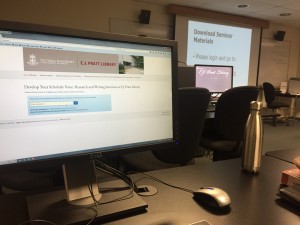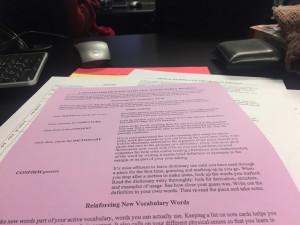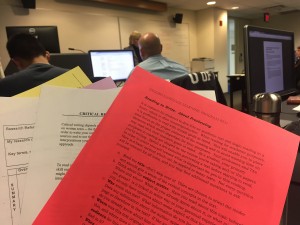The way I see it, university is mainly about two things: reading and writing. Obviously this is an oversimplified view of what it means to be a student at University of Toronto, but one can hardly deny that outside of lectures and tutorials, the majority of student life is spent with either your nose in a book, or your fingers frantically typing away at an essay. I acknowledge that for some programs, essay writing isn’t a big component, but if you replace essays with problem sets or lab reports, the amount of writing that needs to be done for those are probably at par with writing essays.
I mention this because last Friday, I attended a critical reading seminar at E.J. Pratt Library and so I thought, why not write about what I learned at the seminar. Earlier this year, I wrote a post about going to the Writing Plus workshop offered by the Writing Centre. I was surprised by what I took away from the workshop so I thought to myself, lets see what I can take away from a critical reading seminar. Much like the Writing Plus workshop, I really wasn’t expecting to walk away from the seminar with very much in the way of new insights, but unsurprisingly, there were significant nuggets of wisdom that I thankfully was able grasp!
One very practical thing that stood out from the seminar was the explanation of how to write an A paper. Now I know that it’s strange that we were talking about how A papers are evaluated in a critical reading seminar, but the reason why is because an A paper requires active engagement with the research material used for it. The way you approach reading journal articles or other scholarly material during your research period and how you incorporate the information gleaned from those is probably the single most important thing that separates an A paper from a non-A papers.
So what are the components of an A paper and how does the way you read your research material impact your grade? An A paper is a paper that successfully combines your academic voice with analysis, synthesis and evaluation of your research material. In other words, pulling quotes from a source willy nilly is not an effective way to use your research material. I say this because I am one of those people who, when researching, tend to make notes mostly of quotes I can pull from the material that will somehow fit into my argument. And as much as this method has been working for me, it sometimes can lead to overstretching of my arguments. To improve, I’ve learned that I need to let my research marinate in my mind before I even attempt to use any quotes in my essays. In other words, as good as I am with the analysis portion of my research, I can do a much better job with synthesizing the material in order to better evaluate how it could strengthen my argument and my paper as a whole.
Another take away that actually has changed my perspective on research and writing essays came from a simple statement made by the instructor: “[we] are scholars in training.” To me this means that even though I may not be at the level where I am publishing peer reviewed articles for prestigious academic quarterlies, I am training to do so. This means that the essays that I write in undergrad should uphold the same academic integrity of scholarly communication as those that I hope to write sometime down the line in my academic career. In other words, in my limited undergrad capacity, through these assignments I should be striving to seriously contribute to the academic field that I am training in. That is my job as a student. This means that I can’t continue to look at my assignments as simply just a checklist of what needs to be done in order to complete my degree. I need to start looking at them as a possible major contribution to academia. I need to fully be part of the academic community.
This seminar definitely gave me new energy in this otherwise energy draining season. Leave a comment below to let me know how you approach research assignments.
Resources: U of T St. George Library Workshops



0 comments on “Being Part of the Academic Community: Critical Reading Seminar”